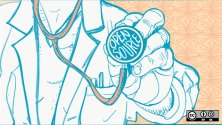Sharing health information like diagnoses, lab tests, or prescriptions easily and securely has been a huge challenge for doctors, hospitals, and patients. In fact, many in the healthcare industry still exchange information by mail or fax.
The Direct Project works to bring healthcare into the computer age, improving patient care and curbing costs by helping people share information more effectively.
The Direct Project took a page from the open source community by bringing together several dozen organizations to collaborate to create "a simple, secure, scalable, standards-based way for participants to send authenticated, encrypted health information directly to known, trusted recipients over the Internet." The group is working to establish standards and documentation to support simple scenarios of pushing data from where it is to where it's needed.
When asked why the government went with an open source approach, Dr. Douglas Fridsma, head of standards at the federal health information technology office explained that "We won’t see the rapid innovation we want to see using the traditional way."
And he was right. This month the government’s office of national health information technology announced that the Direct Project's pilot programs have begun to launch just ten months after the project kick-off.
The first two production networks using Direct Project specifications are live:
- VisionShare enables Hennepin County Medical Center to send immunization information to the Minnesota Department of Health.
- Rhode Island Quality Institute implements provider-to-provider health information exchange with Dr. Al Puerini and members of the Rhode Island Primary Care Physicians Corporation.
Safe, fast, Internet-based transfers of most-needed health information is on its way to becoming a reality in the United States.
The Direct Project homepage has an interactive map listing all of the implementation geographies that will be going live later this year.






2 Comments